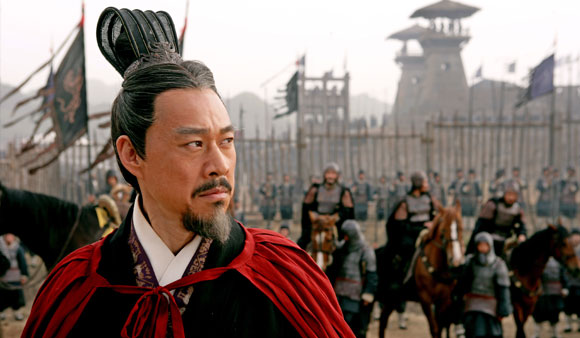Red Cliff (Chi Bi)

John Woo’s Red Cliff is made in the style of Chinese war epics. Two rulers ally against the tyrannical Cao Cao (Fengyi Zhang) to free their lands. The story of peasants versus warlords is often recycled in popular mythology. So exhausted is this genre that Ang Lee, who popularized it in the west, has all but abandoned it. In a Q&A session at Walker Art Center in 2005, I asked Mr. Lee to name his favorite images from past films. Arguably his most familiar work (prior to Brokeback Mountain), Crouching Tiger, Hidden Dragon didn’t come up once. I suspect he’d done the film for commercial and critical success, but not as a matter of personal pleasure.
Mr. Woo, typically known in America for his large set pieces replete with endless slow motion shots breaking up action sequences (and padding time), provides lush visuals and some kind of moral tale to encapsulate what’s essentially China’s most expensive action film yet. This is not the serious drama of Zhang Yimou’s 1991 film, Raise the Red Lantern.
Set in 208 A.D., Red Cliff begins with a voice-over in English by Phillip Hersh as Emperor Han, but character dialogues are entirely in Mandarin. Liu Bei (Yong You) is protecting his people, who have become refugees, as they flee from Xin Ye City. After an attack by 800,000 of Cao Cao’s troops, Liu Bei sends an emissary, Kong Ming, to East Wu to ally with Sun Quan (Chen Chang) against the Emperor. Kong Ming appeals to the pacifistic Sun, “Every sword must be unsheathed some day.”
The film’s countless canned platitudes aside, an intriguing plot unfolds wherein intellect and brute strength play against one another as the mercurial Kong Ming utilizes scientific knowledge of the terrain, the weather and human psychology to gain advantage against Cao’s armies who vastly outnumber them. Some may be familiar with martial arts techniques which rely upon using the opponent’s momentum and force against themselves. Kong Ming’s strategy is not unlike this, at one point taking the enemies’ weapons without breaching integrity by cheating or stealing.
The film is not without its weaknesses, as more intellectual and superficially philosophical musings serve as springboards for lengthy action sequences. But within the battle scenes and occasional obligatory quotations of Sun-Tzu, tactics and strategy are examined in detail. Some questions arise in the process. When it’s argued that a single reed can easily break, but reeds bunched together are impervious to the same force, wouldn’t the obvious response be proportionately more force? Also, when Liu Bei and Sun Quan’s armies employ tactics they acknowledge are outdated, wouldn’t the armies of the Han dynasty anticipate spears jutting out between interlocked shields? It’s the simplest things that often escape these hero myths.
There are several positives I did not expect from Mr. Woo. This isn’t yet another Hong Kong, “wire-fu” martial arts film. Rather, traditional battlefield scenarios only skirt the edge with an occasional superhuman feat. Also, there are consequences for abandoning integrity. When Cao Cao infects soldiers with typhoid by floating corpses downstream to Bei and Quan’s camp, their generals do not respond in kind. Instead, the infected are quarantined and Cao’s corpses are given an appropriately somber, respectful cremation ceremony.
The film falls short of achieving the stature of, for example, Akira Kurosawa’s Ran—retelling Shakespeare’s King Lear. But Mr. Woo doesn’t seem to be aiming for such heavy drama, perhaps wisely conceding he isn’t the director for the job. There is, however, a nod to Lady Kaede but with a sort of twist. Quan’s wife, Xiao Qiao (Chiling Lin), longed after by Cao Cao, shares Quan’s pacifist views but also his sense of duty toward the people. She is not the one-dimensional, passive support system for the male protagonist typical of many Hollywood films.
The usual John Woo staples are present both in the action set narrative wrapped in aphorisms, as well as the juxtapositions of battle scenes with visual poetry. In one shot, Kong Ming, Sun Quan and others pause to contemplate the scenery—a beautiful vista of oddly-shaped hilltops enveloped in mist—reminding themselves of what they fight to protect. Also, a recurring theme is the exposure of womens’ midsections. One of Kong Ming’s trusted spies unravels her clothing—a large map of Cao Cao’s fortress. These scene compositions show beauty, intimacy, and vulnerability—risks taken against social taboos for the greater good. Set against the bloodshed of war in which, as Quan concludes, no one is a victor, it raises the point that traditions do not necessarily connote ethics or honor.
 Red Cliff • Dolby® Digital surround sound in select theatres • Aspect Ratio: 2.39:1 • Running Time: 146 minutes • MPAA Rating: R for sequences of epic warfare. • Distributed by Magnet Releasing
Red Cliff • Dolby® Digital surround sound in select theatres • Aspect Ratio: 2.39:1 • Running Time: 146 minutes • MPAA Rating: R for sequences of epic warfare. • Distributed by Magnet Releasing